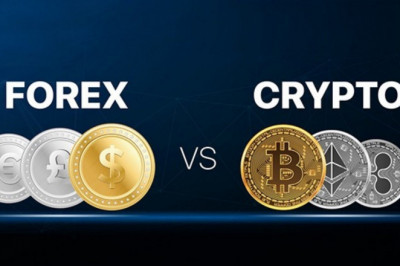views
Spot Bitcoin ETFs: Everything You Need to Know
The financial landscape is evolving, and one of the most discussed topics in cryptocurrency investment is the rise of spot Bitcoin ETFs. These innovative financial products allow traditional investors to access Bitcoin through regulated platforms, offering a bridge between conventional finance and the decentralized world of cryptocurrencies. This article delves into the mechanics, advantages, risks, and market implications of spot Bitcoin ETFs, providing a comprehensive guide for anyone interested in this burgeoning investment avenue.
What is a Spot Bitcoin ETF?
A spot Bitcoin ETF is a financial product that tracks the current market price of Bitcoin and allows investors to buy shares of Bitcoin through traditional stock exchanges. Unlike futures-based Bitcoin ETFs, which speculate on future Bitcoin prices through derivative contracts, spot Bitcoin ETFs hold actual Bitcoins as their underlying asset.
This fundamental difference makes spot Bitcoin ETFs more appealing for investors looking for a direct, simplified way to invest in Bitcoin.
Key Features of Spot Bitcoin ETFs
-
Physical Backing: Spot ETFs hold real Bitcoins in secure custodial wallets.
-
Market Price Tracking: Their value directly reflects the real-time price of Bitcoin.
-
Accessibility: Investors can trade shares of the ETF using brokerage accounts, bypassing the technical challenges of managing cryptocurrencies.
This accessibility has made spot Bitcoin ETFs a significant milestone in the integration of Bitcoin into mainstream finance.
How Spot Bitcoin ETFs Work
Spot Bitcoin ETFs function similarly to traditional ETFs but with a unique focus on cryptocurrency. When you invest in a spot Bitcoin ETF, you’re essentially buying a share in a fund that holds physical Bitcoins. This simplifies the investment process, especially for those unfamiliar with crypto wallets and blockchain technology.
Mechanics of Spot Bitcoin ETFs
-
Bitcoin Custodianship: The ETF provider purchases and securely stores Bitcoin in digital wallets managed by third-party custodians.
-
Shares Representation: Each share of the ETF represents a portion of the Bitcoin held by the fund.
-
Brokerage Integration: Investors can buy and sell shares of the ETF through regulated stock exchanges, just like they would with traditional ETFs.
This structure offers a more user-friendly alternative to directly purchasing Bitcoin, making it especially appealing to beginners in cryptocurrency.
Why Spot Bitcoin ETFs Matter
The introduction of spot Bitcoin ETFs marks a turning point in the adoption of Bitcoin by mainstream finance. They have the potential to make Bitcoin more accessible to a broader audience, from institutional investors to everyday retail traders.
Significance of Spot Bitcoin ETFs
-
Increased Adoption: By providing a regulated pathway, spot Bitcoin ETFs encourage traditional investors to enter the cryptocurrency market.
-
Market Maturity: The inclusion of Bitcoin in ETFs legitimizes its role as an asset class.
-
Global Reach: Spot Bitcoin ETFs have the potential to bring Bitcoin into the portfolios of investors worldwide.
For instance, investors looking to diversify their portfolios with cryptocurrency exposure can now do so without the complexities of managing digital wallets or private keys.
Advantages of Spot Bitcoin ETFs
Spot Bitcoin ETFs come with a host of benefits that cater to both experienced and novice investors. They are designed to address common challenges faced by those looking to invest in cryptocurrencies.
Key Benefits
-
Ease of Access: Investors can trade Bitcoin ETFs through their existing brokerage accounts.
-
Regulatory Protection: Operating within a regulated framework offers added security.
-
Simplified Management: There’s no need to worry about securing private keys or setting up wallets.
For example, if you’re an investor familiar with trading traditional assets like stocks or commodities, a spot Bitcoin ETF eliminates the learning curve associated with blockchain technology.
Risks and Considerations
Despite their advantages, spot Bitcoin ETFs are not without risks. Understanding these risks is crucial for making informed investment decisions.
Major Risks
-
Market Volatility: Bitcoin’s price is highly volatile, which directly impacts the ETF’s value.
-
Fees and Expenses: ETF management fees can eat into profits over time.
-
Regulatory Uncertainty: The future regulatory environment for cryptocurrencies remains unclear.
For example, while the approval of spot Bitcoin ETFs in some countries has driven enthusiasm, others remain hesitant due to concerns over market manipulation and investor protection.
Impact on Bitcoin Market
The introduction of spot Bitcoin ETFs has already started to influence Bitcoin’s market dynamics. These ETFs contribute to Bitcoin's price stability, increased liquidity, and broader adoption.
Market Influence
-
Price Appreciation: The approval of spot Bitcoin ETFs has historically led to Bitcoin price rallies due to increased demand.
-
Institutional Participation: Institutions are more likely to invest in Bitcoin through regulated ETFs than directly purchasing the cryptocurrency.
-
Market Liquidity: Spot Bitcoin ETFs bring significant liquidity to the market, benefiting all participants.
For instance, with Bitcoin trading pairs like BTC USDT, we can observe how increased demand from ETF investors boosts trading volumes and impacts price action. This highlights how spot Bitcoin ETFs integrate seamlessly with existing crypto trading ecosystems.
Future Outlook for Spot Bitcoin ETFs
The future of spot Bitcoin ETFs looks promising, with experts predicting continued growth in adoption and market influence.
What Lies Ahead
-
Global Adoption: As regulatory frameworks improve, more countries are likely to approve spot Bitcoin ETFs.
-
Market Innovation: Spot ETFs could pave the way for similar products focused on other cryptocurrencies.
-
Institutional Growth: Increased participation from institutions will likely bring more stability to the crypto market.
For example, analysts suggest that the expansion of spot Bitcoin ETFs into emerging markets could further boost Bitcoin’s role as a global store of value.
Conclusion
Spot Bitcoin ETFs represent a significant milestone in the integration of Bitcoin into traditional finance. They offer a regulated, accessible, and user-friendly way to invest in Bitcoin, opening the doors for wider adoption and market growth. However, as with any investment, it’s crucial to weigh the advantages and risks carefully. By doing so, investors can take full advantage of this innovative financial product and navigate the exciting world of cryptocurrency with confidence.











